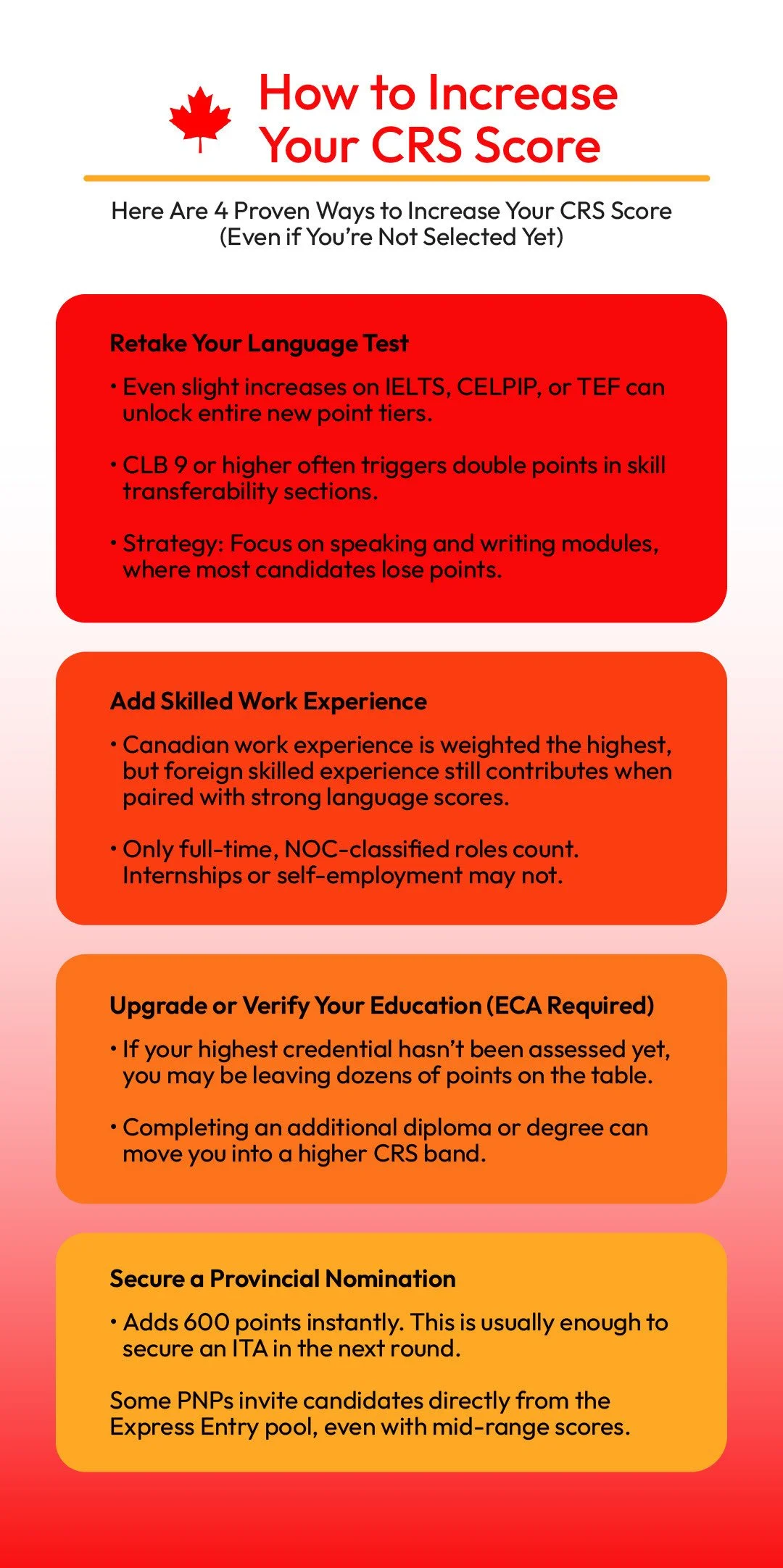Your CRS Score Explained: What It Means for Your Immigration Application
Summary:
A Comprehensive Ranking System (CRS) score determines your position in Canada’s Express Entry pool. It’s calculated based on age, education, language skills, and work experience, with additional points available for provincial nominations, Canadian education, or French ability. Even small score increases can dramatically improve your chances of receiving an Invitation to Apply (ITA). After receiving one, applicants must complete an Immigration Medical Exam (IME) with an IRCC-approved Panel Physician to move forward without delays or refusals.
Time to Read: 6 minutes
What You’ll Learn:
What a CRS score is and how it’s calculated
How CRS scores influence Express Entry invitations
Practical ways to raise your CRS score
When you need an Immigration Medical Exam (IME)
Next Steps:
Check your CRS score using IRCC’s online tool
Update your profile as your language scores, education, or experience improve
Explore provincial nomination options for a 600-point boost
After receiving an ITA, book your IME promptly with a Panel Physician
Your CRS Score Explained: What It Means for Your Immigration Application
The Comprehensive Ranking System (CRS) is the scoring model used by Canada’s Express Entry system to compare eligible immigration candidates against one another. Think of it as your competitive ranking within a national pool of applicants. The higher your CRS score, the more likely you are to receive an Invitation to Apply (ITA) for permanent residency.
But how is your CRS score calculated, and what steps can you take to improve it? Panel Physician covers the most important information you need to answer these questions below. Read on to learn more, including when and where to book your Immigration Medical Exam as part of your immigration process.
The Factors that Make Up Your CRS Score
Your CRS score is calculated out of 1,200 points, tallied across several core categories:
Core / Human Capital Factors
Age
Education
Language proficiency
Canadian work experience
Spouse or Common-Law Partner Factors (If Applicable)
Education
Language test results
Skill Transferability Factors
Specific combinations of:
Education
Language
Foreign work experience
Additional Points
While job offers no longer provide CRS points, you may still earn additional points for having any of the following:
Provincial or territorial nomination: 600 points
Post-secondary education completed in Canada: 15–30 points
Strong French language ability: up to 50 points
Having a sibling in Canada who is a citizen or permanent resident: 15 points
Each of these factors helps determine how well you are likely to integrate into the Canadian labour market. The system is intended to reward proven skills, adaptability, and long-term employability.
Important Note: IRCC stopped awarding CRS points for job offers on March 25, 2025. However, job offers may still be required for eligibility under certain programs like the Federal Skilled Trades Program (FSTP) or specific Provincial Nominee Program (PNP) streams, so you should still include them in your Express Entry profile.
Related: Canada’s Express Entry Draw: What It Is & How It Works
Where to Check Your CRS Score:
The Government of Canada makes it easy to check your CRS score online. You can use the tool at the link below to get an idea of what your score will most likely be and take steps to improve it if needed. Note that this tool is only intended as a reference based on the answers you provide, and is not a guarantee of what your actual score will be.
How Your CRS Score Affects Your Chance of Immigration
Express Entry isn’t first-come, first-served. It’s a merit-based program. Roughly every two weeks, the Canadian government conducts a draw, selecting from applicants whose CRS scores meet or exceed the cut-off score for that round.
If your score is above the cut-off, you receive an Invitation to Apply (ITA) for permanent residency.
If your score is below, you remain in the pool for up to 12 months. This gives you extra time to boost your score before the next draw.
Understanding your CRS score (and how to improve it) can make the difference between waiting indefinitely and getting accepted quickly. Next, you’ll learn what you can do to help increase your score and enhance your chances of receiving an invitation to apply.
How to Increase Your CRS Score
Even a difference of 10–20 points can be enough to significantly alter your chances. Some of the most effective strategies for raising your CRS score include:
Retaking your language test (IELTS, CELPIP, or TEF): Small score improvements can still result in higher CRS scores, especially if you move into a higher Canadian Language Benchmark (CLB) category.
Gain more skilled work experience: Canadian work experience is weighted heavily. However, even foreign work experience can help you gain more points, especially if you also demonstrate language proficiency.
Complete an additional credential or get an Educational Credential Assessment (ECA): This is one of the easiest ways to increase your education level, which also makes it one of the fastest ways to gain points.
Secure a Provincial Nomination (PNP): This instantly adds an extra 600 points to your application, which is typically enough to secure you an ITA in the next round.
Infographic: How to Increase Your CRS Score
Here Are 4 Proven Ways to Increase Your CRS Score (Even if You’re Not Selected Yet)
Retake Your Language Test
Even slight increases on IELTS, CELPIP, or TEF can unlock entire new point tiers.
CLB 9 or higher often triggers double points in skill transferability sections.
Strategy: Focus on speaking and writing modules, where most candidates lose points.
Add Skilled Work Experience
Canadian work experience is weighted the highest, but foreign skilled experience still contributes when paired with strong language scores.
Only full-time, NOC-classified roles count. Internships or self-employment may not.
Upgrade or Verify Your Education (ECA Required)
If your highest credential hasn’t been assessed yet, you may be leaving dozens of points on the table.
Completing an additional diploma or degree can move you into a higher CRS band.
Secure a Provincial Nomination
Adds 600 points instantly. This is usually enough to secure an ITA in the next round.
Some PNPs invite candidates directly from the Express Entry pool, even with mid-range scores.
After You Receive an ITA: Don’t Forget Your IME!
Once your ITA arrives, the next priority is submitting your permanent residency application. This must include a valid Immigration Medical Exam (IME) from an approved Panel Physician.
The IME helps IRCC ensure that you won’t present a significant risk to public health or place undue strain on Canada’s healthcare system once you arrive. However, this exam isn’t something your family doctor can do. It must be completed by a designated medical professional who follows IRCC reporting standards. Otherwise, your application can be returned or delayed.
At Panel Physician, we provide accurate IMEs at five facilities throughout the GTA. Booking with us guarantees you:
IMEs that meet IRCC medical standards
Results submitted directly to the government on your behalf via eMedical
No delays caused by incomplete or outdated medical reports
Many applicants wait too long to book their exam, but scheduling it right after receiving your ITA ensures your application stays on track.
Related: How to Prepare For Your Immigration Medical Exam in 2025
Check Your CRS Score Today & Make Sure You’re Ready to Apply
Don’t think of your CRS score as an arbitrary number. Think of it as your position in line for Canadian permanent residency. The more you know about how this score is calculated, the more you can do to raise yours and streamline your journey to Canada.
Take the next step by checking your CRS score today, then contact a Panel Physician as soon as your ITA arrives to finalize your medical requirements without delays.



